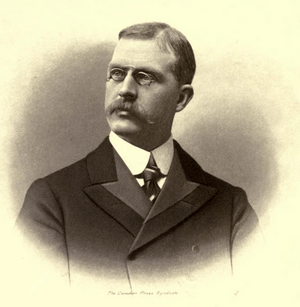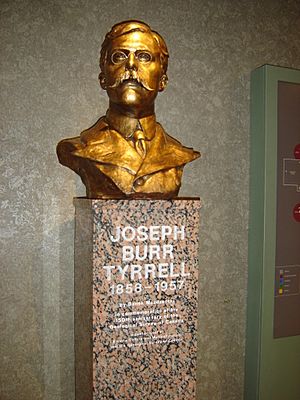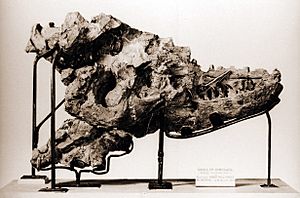Joseph Tyrrell facts for kids
Quick facts for kids
Joseph Tyrrell
|
|
|---|---|
 |
|
| Born |
Joseph Burr Tyrrell
November 1, 1858 Weston, Canada West, Province of Canada
|
| Died | August 26, 1957 (aged 98) Toronto, Ontario, Canada
|
| Alma mater | Upper Canada College University of Toronto |
| Known for | discovery of Albertosaurus in Alberta, c. 1884 |
| Scientific career | |
| Fields | geology, cartography |
Joseph Burr Tyrrell (born November 1, 1858 – died August 26, 1957) was a Canadian geologist, mapmaker, and mining expert. He is famous for finding Albertosaurus dinosaur bones in Alberta, Canada, in 1884. He also found coal near Drumheller. The famous Royal Tyrrell Museum of Palaeontology in Alberta is named after him.
Joseph Tyrrell was born in Weston, Ontario. He was the third child of William and Elizabeth Tyrrell. He went to Weston Grammar School. Later, he studied at Upper Canada College and the University of Toronto. He earned a law degree in 1880. After working for a law firm, his doctor told him to work outdoors. This was because of his health.
Contents
Exploring Canada's Wild Lands
In 1880, Joseph joined the Geological Survey of Canada. He led many important trips to explore Canada. In 1884, he was exploring the Badlands of Alberta. This is where he found the bones of a large meat-eating dinosaur. This dinosaur was later named Albertosaurus. He also found large amounts of coal in the area.
Journeys to the North
Tyrrell led two big trips into the Northern Barren Lands. These trips happened in 1893 and 1894. He traveled down the Dubawnt River. This was the first time a European had visited this area since the 1770s. His younger brother, James Williams Tyrrell, joined him on these trips. During these journeys, they met the Ihalmiut people. They are an Inuit group from what is now Nunavut.
Later Life and Discoveries
In 1894, Tyrrell married Mary Edith Carey. They had three children: Mary, George, and Thomas. Mary Edith helped start the Women's Association of the Mining Industry of Canada. Joseph Tyrrell also found old notes and maps from another explorer, David Thompson. In 1916, he published these important writings as David Thompson's Narrative.
A Career in Mining
In 1898, Tyrrell started working in the gold-mining business. He continued this work for over 50 years. For many years, starting in 1926, he managed the Kirkland Lake Gold Mine in northern Ontario.
Retirement and Legacy
Joseph Tyrrell retired to Scarborough, near the Rouge River. He started large apple orchards there. He was very interested in growing and breeding new types of apples. These orchards later became the site of the Toronto Zoo. Joseph Tyrrell passed away in Toronto in 1957. He was 98 years old.
Honours and Awards

Many places and institutions are named after Joseph Tyrrell. This is to honor his important work.
Places Named for Tyrrell
- Tyrrell Sea: This was a prehistoric (very old) Hudson Bay.
- Tyrrell Arm: A part of Yathkyed Lake in Nunavut.
- Joseph Burr Tyrrell Park: A park in Toronto, Ontario.
- Tyrrell Lake: A small lake in Alberta.
Institutions Named for Tyrrell
- Royal Tyrrell Museum of Palaeontology: A famous dinosaur museum in Drumheller, Alberta.
- J. B. Tyrrell Senior Public School: A school in Scarborough, Ontario.
- Joseph Burr Tyrrell Elementary School: A school in Fort Smith, Northwest Territories.
Awards and Recognition
Joseph Tyrrell received many awards for his work. Some of these include:
- 1896 Back Award from the Royal Geographical Society.
- 1918 Murchison Medal from the Geological Society of London.
- 1930 Daly Medal from the American Geographical Society.
- 1947 Wollaston Medal from the Geological Society of London.
- 1997 He was added to the Canadian Mining Hall of Fame.
Other Honours
- The J.B. Tyrrell Historical Medal is given out by the Royal Society of Canada. It is named after him.
Tribute
On November 1, 2018, Google Doodle celebrated Joseph Tyrrell's 160th birthday.
See also
 In Spanish: Joseph Burr Tyrrell para niños
In Spanish: Joseph Burr Tyrrell para niños


